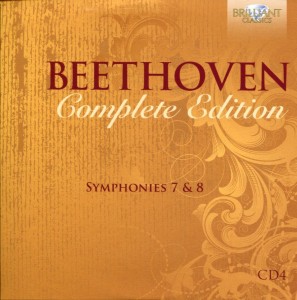 Even when I’m in a shitty mood (as I am right now), I can count on a Beethoven symphony to offer something interesting to discover that’ll lift me out of it.
Even when I’m in a shitty mood (as I am right now), I can count on a Beethoven symphony to offer something interesting to discover that’ll lift me out of it.
And Symphony No. 7 in A Op. 92 offered plenty.
For one thing, Movement I (“Poco sostenuto – Vivace”) contained repeating melodies that I found myself listening for.
Movement I is dynamic in a way that I’ve come to expect from Beethoven. But also just as delicate.
But it was Movement II (“Allegretto”) that really caused me to sit up and take notice. I’ve heard this before. Recently, in fact. So I dug around a bit (meaning I Googled) and discovered that it’s part of the score to the Oscar-winning movie The King’s Speech. It’s the music playing as the King prepares to deliver his speech to the nation regarding England’s response to Hitler.
Movement II is as brilliant a piece of music as I’ve ever come across. It’s majestic, stately, melodic, intricate, and compelling. I am drawn to it. It is musical magic.
Speaking of the second movement (can I hear something remarkable, or can I hear something remarkable?), its entry on Wikipedia says this:
The Symphony No. 7 in A major, Op. 92, is a symphony in four movements composed by Ludwig van Beethoven between 1811 and 1812, while improving his health in the Bohemian spa town of Teplice. The work is dedicated to Count Moritz von Fries.
At its première, Beethoven was noted as remarking that it was one of his best works. The second movement, Allegretto, was the most popular movement and had to be encored. The instant popularity of the Allegretto resulted in its frequent performance separate from the complete symphony.
And this, later in the Wiki entry:
The piece was very well received, and the second movement, the Allegretto, had to be encored immediately. Spohr made particular mention of Beethoven’s antics on the rostrum (“as a sforzando occurred, he tore his arms with a great vehemence asunder … at the entrance of a forte he jumped in the air”), and the concert was repeated due to its immense success.
See? The second movement was an instant hit. It struck me that way, too. A remarkable composition, the most achingly beautiful I’ve ever heard – possibly the greatest piece of music I’ve yet heard in my explorations of major composers.
Movement III (“Presto – Assai meno presto”) bolts out of the gate like a race horse smacked in the ass. It’s powerful music, but with hints of delicate elegance arising amidst the bombast. Sort of like flowers poking through cracks in asphalt. Unexpected beauty.
Movement IV (“Allego con brio”) is con a lot of brio. It’s boisterous and bombastic, a total eye opener. If this was my alarm clock music I’d spring out of bed and dash off to greet the day.
This is a flamboyant, dynamic, compelling symphony.
From Wiki:
The work was premiered with Beethoven himself conducting in Vienna on 8 December 1813 at a charity concert for soldiers wounded in the Battle of Hanau. In Beethoven’s address to the participants, the motives are openly named: “We are moved by nothing but pure patriotism and the joyful sacrifice of our powers for those who have sacrificed so much for us.”
Mozart was 41-42 when he composed Symphony No. 7, 43 at its premier.
The second symphony on this CD – Beethoven Symphony No. 8 in F Op. 93 – is, according to its entry on Wikipedia,
a symphony in four movements composed by Ludwig van Beethoven in 1812. Beethoven fondly referred to it as “my little Symphony in F,” distinguishing it from his Sixth Symphony, a longer work also in F.
The Eighth Symphony is generally light-hearted, though not lightweight, and in many places cheerfully loud, with many accented notes. Various passages in the symphony are heard by some listeners to be musical jokes. As with various other Beethoven works such as the Opus 27 piano sonatas, the symphony deviates from Classical tradition in making the last movement the weightiest of the four.
The work was begun in the summer of 1812, immediately after the completion of the Seventh Symphony. At the time Beethoven was 41 years old. As Antony Hopkins has noted, the cheerful mood of the work betrays nothing of the grossly unpleasant events that were taking place in Beethoven’s life at the time, which involved his interference in his brother Johann’s love life. The work took Beethoven only four months to complete, and is, unlike many of his works, without dedication.
The premiere took place on 27 February 1814, at a concert in the Redoutensaal, Vienna, at which the Seventh Symphony (which had been premiered two months earlier) was also played. Beethoven was growing increasingly deaf at the time, but nevertheless led the premiere. Reportedly, “the orchestra largely ignored his ungainly gestures and followed the principal violinist instead.”
Beethoven was 44 when his Eighth Symphony premiered.
